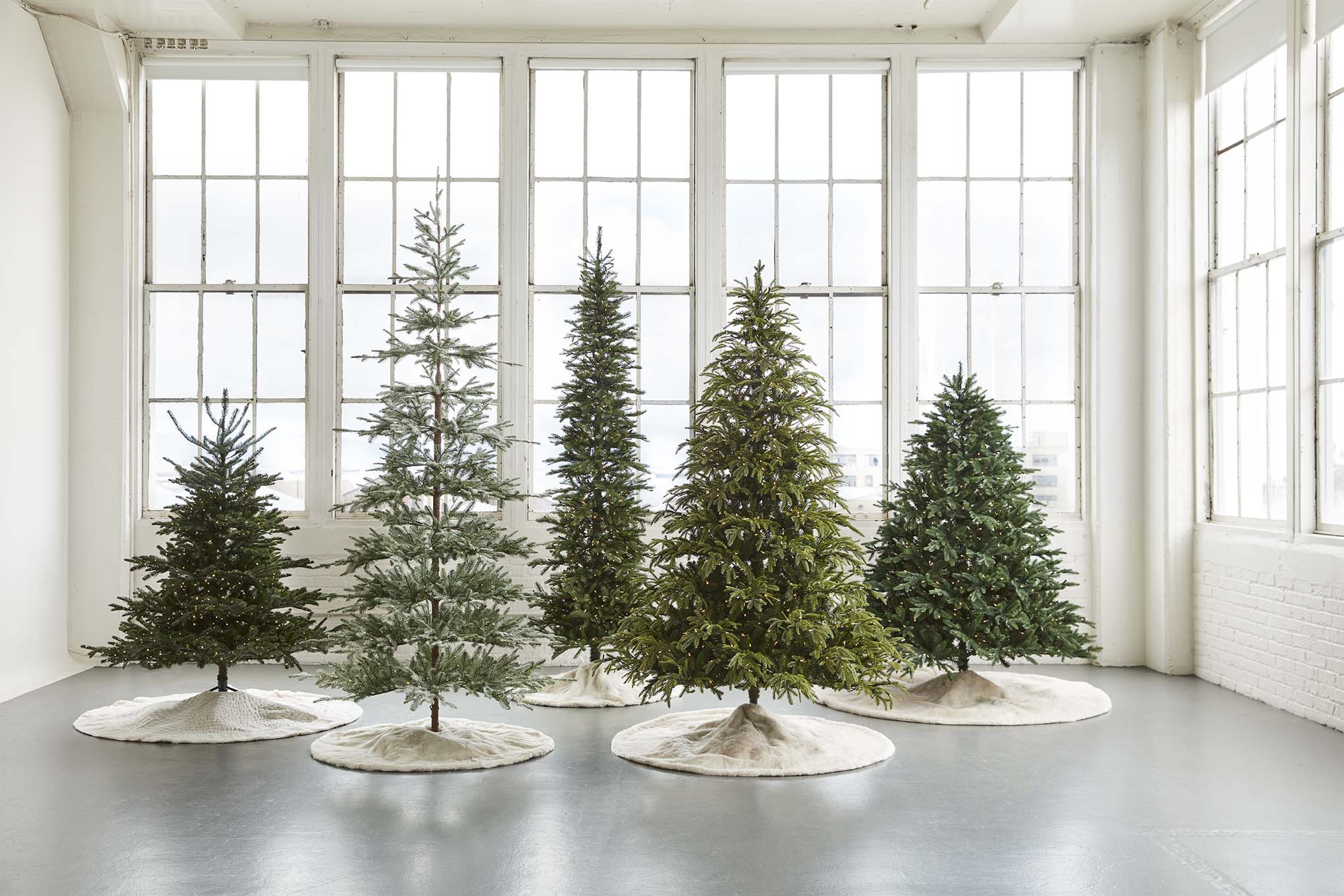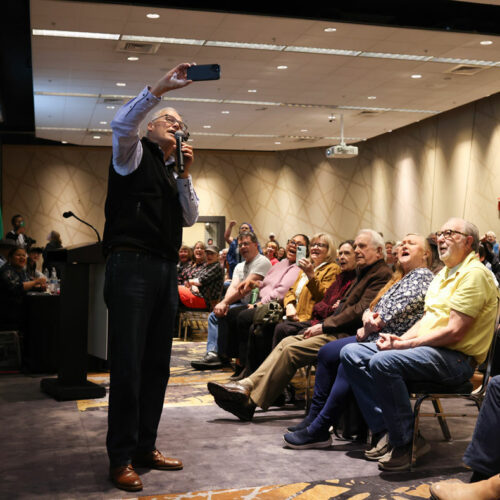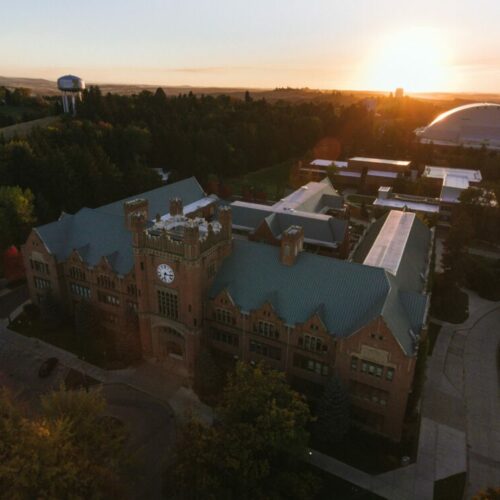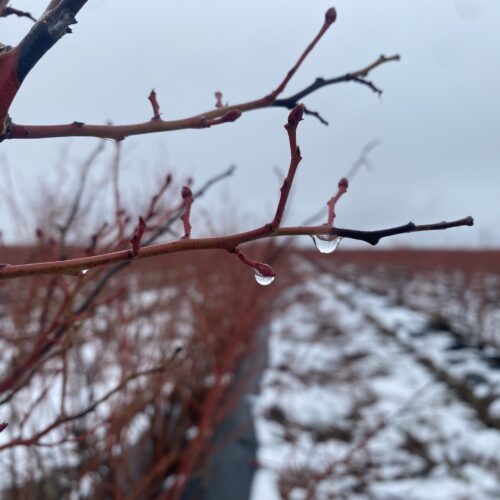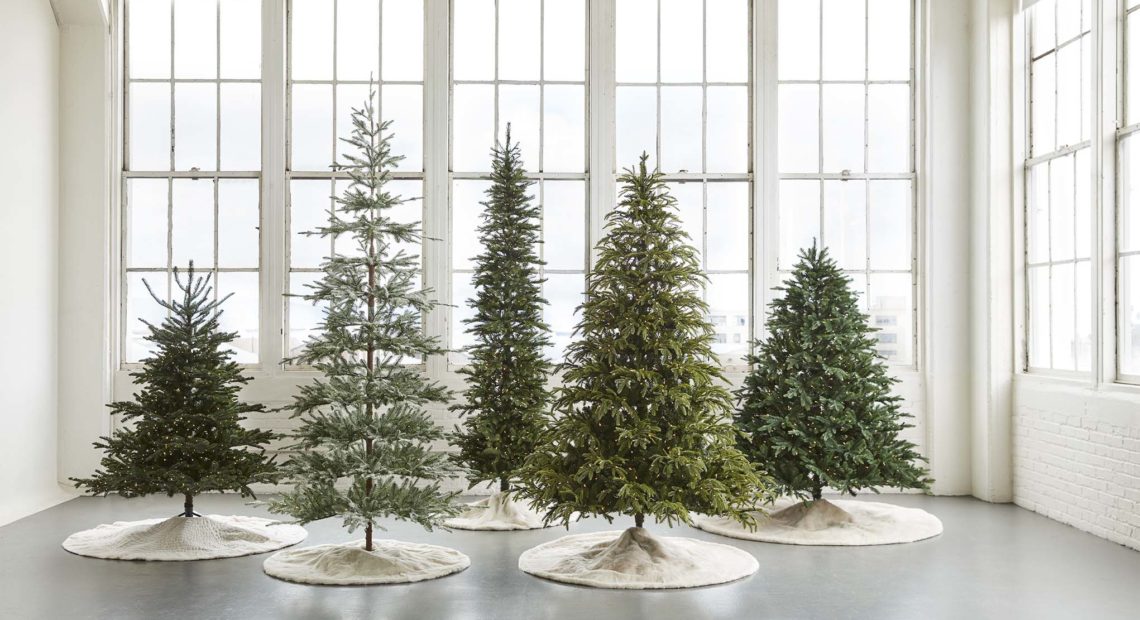
In Season Of Christmas Peace, There’s A Serious Tree-Marketing War Over Your Family
Listen
The Christmas holiday is centered around peace. But an escalating marketing war for families’ hearts is developing between the real and fake tree industries.
The companies behind each type of tree are going at it with ad campaigns online, trying to convince you that their tree is better.
In one video, upbeat tinkley music and fresh-faced American tree farmers chirp: “That smell, that wonderful fresh Christmas tree smell. That beautiful scent that fills the house. Smells like Christmas — that can’t be manufactured.”
“Keep It Real”
The fresh Christmas tree farm industry will spend more than $1 million this year asking you to “Keep It Real,” sort of like the ubiquitous “Got Milk” campaign of the 1990s and 2000s.
These online videos are developed and funded by tree growers, as part of a program overseen by the U.S. Department of Agriculture.
Casey Grogan is one of those growers in Oregon, about an hour south of Portland. His crews are working to cut and ship about 60,000 Christmas trees in 10 days from his Silver Bells Tree Farm.

Casey Grogan is owner of Silver Bells Tree Farm, 400-acres of Christmas trees, in Silverton, Ore.
He wields a medieval-looking brush mower retrofitted with an 18-inch saw blade at the front. He says it’s better than leaning over with a chainsaw.
In the distance, farmworkers pack cut trees on their backs toward muddy roads. When the terrain gets too tough the farm uses helicopters to move trees.
Grogan says it takes at least 8 to 10 years to grow and sculpt a fresh tree for sale. And he really hates artificial trees, which are looking more like his fresh ones every year.
“They are kind of stealing our concept and our art,” he says.
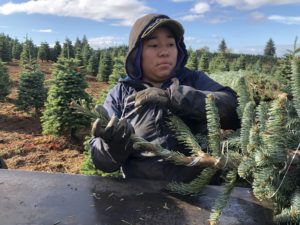
Jessica Garcia runs a baler machine that bundles each Christmas tree for transport to stores across the country and globe. CREDIT: ANNA KING/N3
Grogan’s operation is one of several commercial Christmas tree farms in the foothills of Oregon’s Cascades. He’s lived here his whole life. But even some of his lifelong friends in town have started to buy fake trees.
“I just kind of scoff at it and ask ’em, ‘What are you doing?’” he says. “‘Come on, you know. You’re an outdoors person. How come you have an artificial tree?’”
They usually tell him it’s just easier. And the artificial tree industry is saying that, too.
In a video on the American Christmas Tree Association Facebook page, a man standing in front of an artificial tree in a brightly lit store says: “Real or artificial — there is no bad choice when it comes to picking out the perfect Christmas tree for your family this season. Think about things like price point and seasonal allergies when picking out your tree this year.”
Tree Agnostic
The American Christmas Tree Association is based in Los Angeles and run by Jami Warner. The association represents manufacturers and retailers of real and artificial trees.
“We’re very agnostic when it comes to Christmas trees,” Warner says. “We do believe that it’s a personal choice. We’re very concerned with fire safety, we’re concerned with ease of use, reusability.”
But she insists that all Christmas trees are good Christmas trees. And when it comes to artificial ones, she’s up on all the trends.

Jami Warner is the head of the American Christmas Tree Association which she says represents manufacturers and retailers of real and artificial trees.
“There’s new technology on artificial trees,” she says. “They’re better than ever. LED lights last longer and don’t break. The trees can come pre-fluffed. There are flip trees and snap trees that assemble in seconds. And they can look remarkably real.”
Her organization says people put up more than 21 million in the U.S. last year.
The association’s operating budget is under $200,000. But some big artificial tree companies are doing their own marketing. For example, this season the artificial tree company Balsam Hill is sponsoring the Hallmark Channel and the holiday tour of singer-songwriter Jewel.
Join me on my Handmade Holiday Tour and celebrate the season with a stunning @BalsamHill decorating package! Enter the giveaway for a chance to win VIP tickets for four, and bring home the same Christmas tree & decorating set as seen on my holiday tour! https://t.co/UKIB4HSn8Y pic.twitter.com/4nGiHxYOY7
— Jewel (@jeweljk) November 28, 2017
Answering Back
Tree growers answer with their own videos. One appeals: “Years from now, which do you think you’ll remember the best? Assembling an artificial tree you’ve pulled from the attic? Or going out as a family to select the right tree for you?”
Marsha Gray, the executive director of the Christmas Tree Promotion Board, is behind that video and the associated “Keep It Real” campaign.
Gray is on the hunt for young, decision-making female consumers.
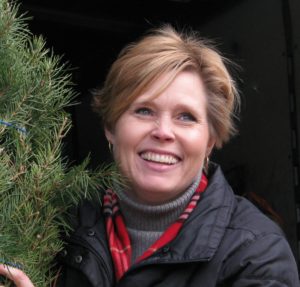
Marsha Gray is the executive director of the Christmas Tree Promotion Board and the “Keep It Real” campaign for fresh tree farmers in the United States.
“Milenium mom is our top sweet spot,” Gray says. “She’s getting her information, doing her shopping online — and that’s where we hope to reach her.”
Fresh Christmas tree growers want to be a part of families’ firsts, Gray explains. “First marriage, first kids, first home — those are key moments for our industry.”
So they are spending most of their farmer-funded budget on social media ads. The campaign came about three years ago, stemming from growers’ concerns over fake trees taking down their market.
This year’s video campaign aims squarely at millennials or other consumers who may have never had a fresh tree in their childhood home. The video shows families experience picking out a real tree, so families can “visualize” the experience, Gray explains.
This spring, tree growers across the United States will have the choice to renew their support for the war against fakes. The industry will vote to renew for another seven years by continuing to tax themselves $0.15 per sold tree if they sell more than 500 trees a year. Smaller growers or “you-cut” lots wouldn’t be taxed.
But it may be years, or a decade, before those farmers know if this campaign is working, Gray says. And some are growing weary and bitter from fighting the continual influx of artificial trees coming in from China.
As farmer Casey Grogan would say, “You want your kids to grow up with a fake tree and a fake life?”
Frustration
For Grogan, uncertainty leads to frustration. It takes about a decade for his noble firs to grow. And because so many people buy artificial trees now, this year it’s hard for him to estimate how many to plant.
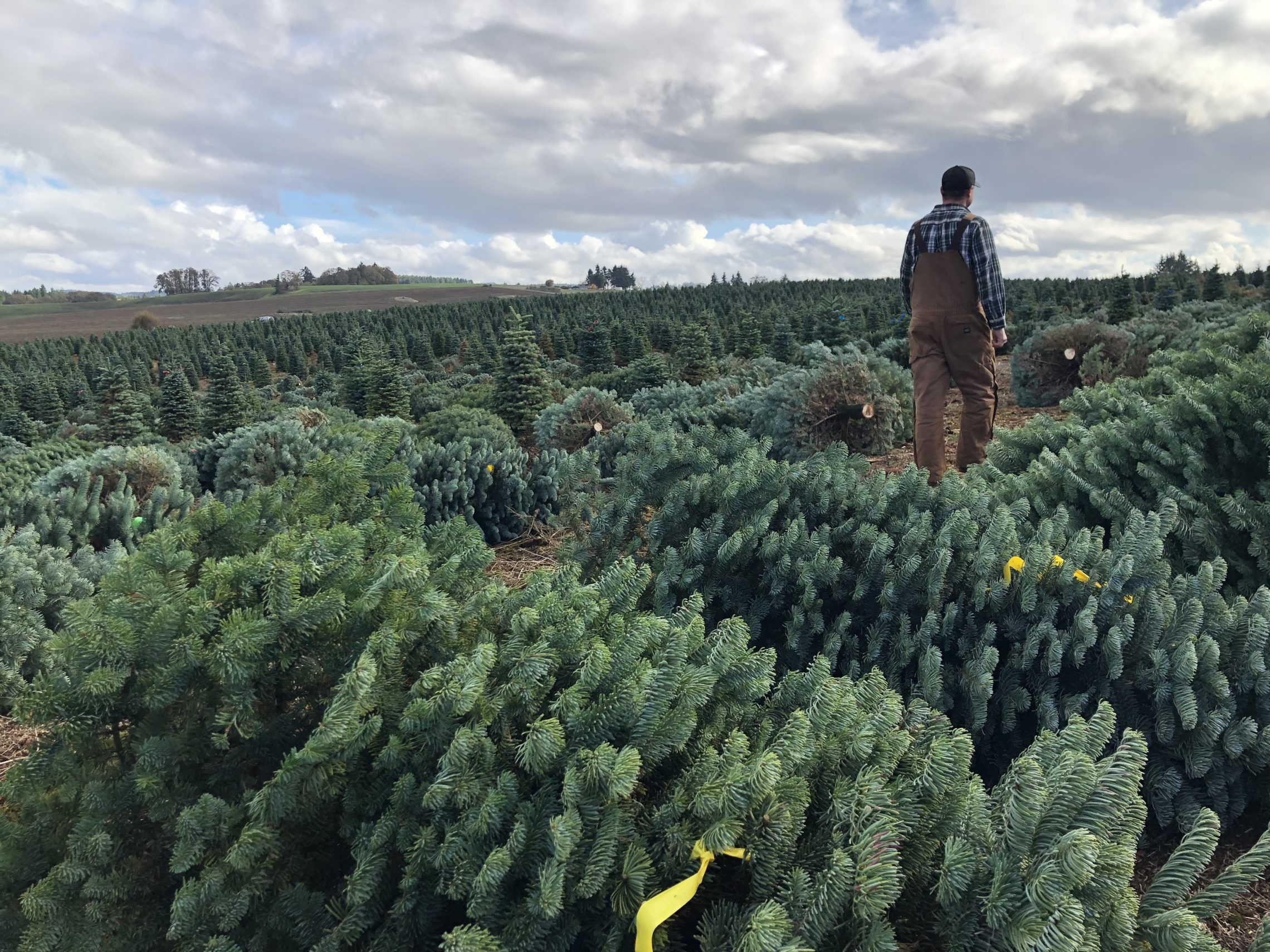
Casey Grogan walks through some recently cut noble fir Christmas trees at his farm near Silverton, Ore. This year he plans to harvest 60,000 trees off his property. CREDIT: ANNA KING/N3
Grogan’s primary frustration is over the market share the artificial tree industry has already won. Even his local farm supply store several miles down the road has started to sell fake trees.
“And that’s really frustrating,” he says. “That I’m supporting them as a business.”
Copyright 2018 Northwest News Network
Related Stories:

Think your light display is big? Check out Walla Walla’s ‘Christmas house’
Visiting the Long family’s light display has become a holiday tradition for many Walla Wallans. (Credit: Cali Long) Listen (Runtime 1:05) Read Drive down Walla Walla’s Wallula Avenue on a

As Northwest snowpack grows, ski resorts open early
A drone photo shows White Pass Ski Area in Naches, Washington, on Dec. 1, 2024. (Credit: Andy Mahre / White Pass Ski Area) Listen (Runtime 1:00) Read Fresh white powder
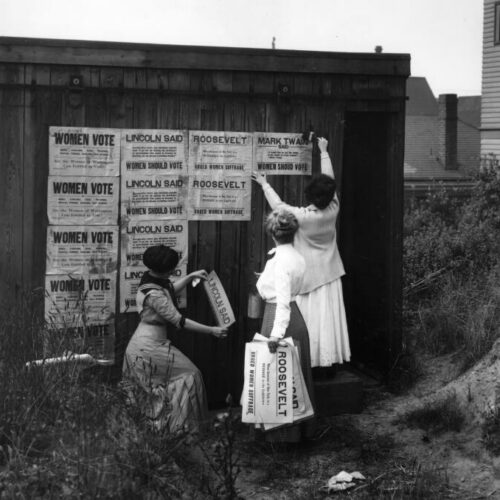
A Paid Holiday In March? It’d Be Women’s Suffrage Day If Washington State Lawmakers Vote Yea
Washington state workers and perhaps many others could get an extra day off in honor of women getting the right to vote. The idea for a Women’s Suffrage Day holiday got a friendly reception on the opening day of Washington’s 2022 legislative session.

